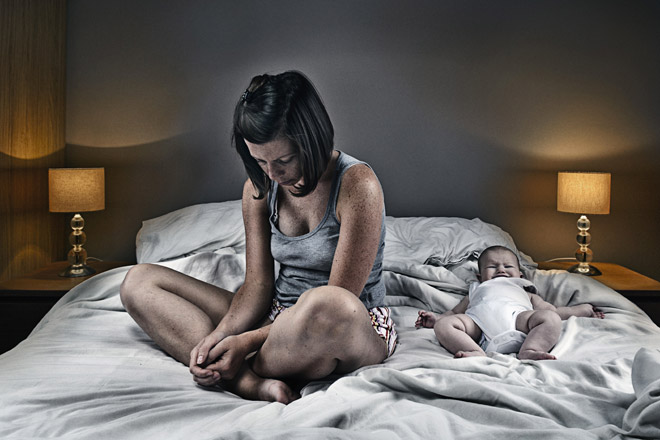Unfortunately there is no way to predict who will experience PPD, but some women are at higher risk for PPD than others. The strongest predictors of postpartum depression are:
- Depression or anxiety during pregnancy
- Stressful life events during pregnancy or soon after giving birth
- Traumatic childbirth experience
- Preterm delivery
- A baby needing neonatal intensive care
- Lack of social support
- Previous history of depression
- Breastfeeding problems
Other risk factors include:
- Unplanned or unwanted pregnancy
- A baby with birth defects or other medical problems
- Multiple babies (such as twins or triplets)
- Family history of psychiatric problems
- Being single
- Low socioeconomic status or financial instability
- Domestic violence
- Unemployment
Remember that these risk factors don’t actually cause PPD. Many women with multiple risk factors never experience clinical depression or anxiety, while others with just one risk factor (or even none) can end up with a diagnosis of PPD.
As Nigerians, many of us turn to God/religion instinctively when faced with any type of problem and while this is not a bad thing, it can be dangerous if a woman has symptoms of PPD and tries to “pray it away” or ignore it because it is “not my portion”.
When Left untreated, postpartum depression can interfere with mother-child bonding and cause family problems.
Therefore it is important that as soon as symptoms are noticed a plan is made to see a doctor.
Your doctor will usually talk with you about your feelings, thoughts and mental health to distinguish between a short-term case of postpartum baby blues and a more severe form of depression. There is no reason to be embarrassed. Share your symptoms as honestly as possible with your doctor so that a useful treatment plan can be created for you.
As proper evaluation of your mental state should be done by a doctor. Part of this evaluation may include:
Completing a depression-screening questionnaire
Blood tests to determine whether an underactive thyroid is contributing to your signs and symptoms
Order other tests, if warranted, to rule out other causes for your symptoms
Treatment
Postpartum depression is often treated with psychotherapy (also called talk therapy or mental health counseling), medication or both.
Psychotherapy. It may help to talk through your concerns with a psychiatrist, psychologist or other mental health provider. Through therapy, you can find better ways to cope with your feelings, solve problems, set realistic goals and respond to situations in a positive way. Sometimes family or relationship therapy also helps. This usually involves inviting other family members to be part of the therapy session and the advantage of this is that it helps the family members understand exactly what is going on and puts them in a better position to help make things easier for the new mother as she undergoes treatment and cares for her baby.
Antidepressants. Your doctor may recommend an antidepressant. Antidepressants balance the brain chemicals that regulate your mood.If you’re breast-feeding, any medication you take will enter your breast milk. However, some antidepressants can be used during breast-feeding with little risk of side effects for your baby. Work with your doctor to weigh the potential risks and benefits of specific antidepressants.
Electroconvulsive therapy (ECT). If your postpartum depression is severe and does not respond to medication, ECT may be recommended. During ECT, a small amount of electrical current is applied to your brain to produce brain waves similar to those that occur during a seizure. The chemical changes triggered by the electrical currents can reduce the symptoms of psychosis and depression, especially when other treatments have failed.
Postpartum depression isn’t generally a condition that you can treat on your own — but you can do some things for yourself that build on your treatment plan and help speed recovery.
- Make healthy lifestyle choices. Include physical activity, such as a walk with your baby, in your daily routine. Try to get adequate rest. Eat healthy foods and avoid alcohol.
- Set realistic expectations. Don’t pressure yourself to do everything. Scale back your expectations for the perfect household. Do what you can and leave the rest.
- Make time for yourself. If you feel like the world is coming down around you, take some time for yourself. Get dressed, leave the house, and visit a friend or run an errand. Or schedule some time alone with your partner.
- Avoid isolation. Talk with your partner, family and friends about how you’re feeling. Ask other mothers about their experiences. Breaking the isolation may help you feel human again.
- Ask for help. Try to open up to the people close to you and let them know you need help. If someone offers to baby-sit so you can take a break, take them up on it. If you can sleep, take a nap, or maybe you can catch a movie or meet for coffee with friends.
Remember, the best way to take care of your baby is to take care of yourself.
With appropriate treatment, postpartum depression usually goes away within six months. In some cases, postpartum depression lasts much longer, becoming chronic depression. It’s important to continue treatment after you begin to feel better. Stopping treatment too early may lead to a relapse.
Untreated depression can be lonely, confusing, and even scary if your condition gets worse. The good news is that it’s quite common and very treatable, so you don’t have to feel like it’s just you.






